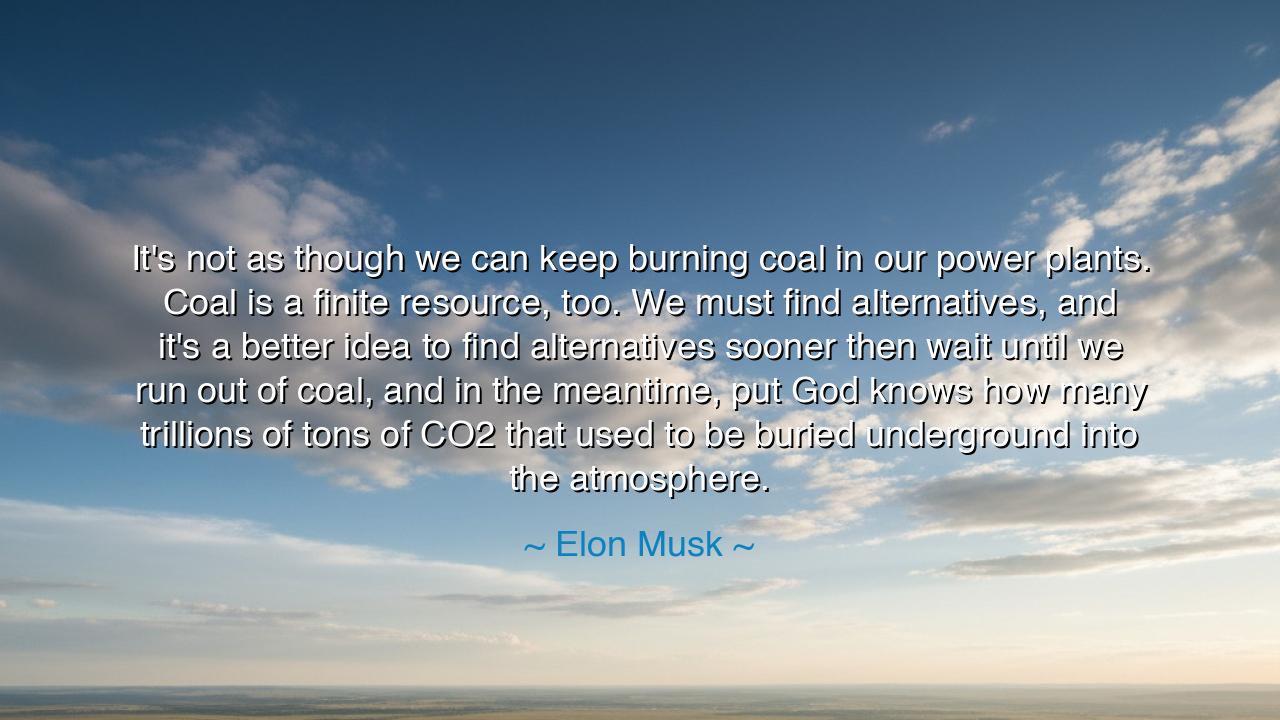
It's not as though we can keep burning coal in our power plants.
It's not as though we can keep burning coal in our power plants. Coal is a finite resource, too. We must find alternatives, and it's a better idea to find alternatives sooner then wait until we run out of coal, and in the meantime, put God knows how many trillions of tons of CO2 that used to be buried underground into the atmosphere.






The words of Elon Musk—“It's not as though we can keep burning coal in our power plants. Coal is a finite resource, too. We must find alternatives, and it's a better idea to find alternatives sooner than wait until we run out of coal, and in the meantime, put God knows how many trillions of tons of CO2 that used to be buried underground into the atmosphere.”—are a trumpet sounding against complacency. They remind us that the treasures of the earth are not infinite, and that to consume without foresight is to march toward ruin. For coal, once a beacon of industry, is also a herald of destruction when relied upon beyond its season.
This utterance speaks of urgency and responsibility. To wait until the last fragment of coal is burned is to act like a fool who eats his last seed in hunger rather than planting it for tomorrow. Musk calls us to act not when we are desperate, but when we still have the strength of choice. It is wisdom echoed by the ancients: to prepare in times of plenty for the trials of scarcity. In the same way, humanity must turn its gaze to alternatives—to the sun, the wind, and the untapped powers of creation.
History bears witness in the tale of Easter Island, where a people cut down their last tree in pursuit of monuments, leaving themselves barren and broken. Their society collapsed, not because they lacked brilliance, but because they consumed without restraint, never turning to a new way. So too does Musk’s warning reach us: that our fate may be the same if we cling to the fleeting comfort of coal while burying ourselves in the poison of CO2.
The quote also carries the weight of moral duty. For it is not only the present generation that breathes the air, but the countless unborn who will inherit the sky we leave behind. To continue burning, knowing the harm, is to wound the future. But to seek alternatives now is to act as guardians, passing on a world not stripped bare, but alive with possibility.
Let this be a lesson to those who come after: do not cling to the familiar when it carries you toward ruin. Act with courage, as those who build not for themselves alone, but for the generations unseen. The earth offers abundance beyond the graveyards of coal; it asks only that we rise above our greed and claim the power of wisdom. For in heeding this call, we may yet turn the tide from destruction to renewal, and let the sky breathe once more.






DTPhat Do Tan
This quote hits on something deeply frustrating: we already know the problem and the solution, yet global action remains slow. It’s like watching a slow-motion disaster unfold. I think Musk’s point about timing is crucial — we need innovation before desperation. Do you think people would be more motivated to act if the effects of coal pollution were visible in their daily lives, like smog or extreme weather?
TTThanh Tung Tran
It’s interesting how Musk frames this as both an environmental and practical issue. He’s not appealing just to idealism, but to logic — that coal will run out anyway, so the smart move is to plan ahead. I wonder if that pragmatic approach could finally convince skeptics who don’t care much about climate change but do care about economic sustainability.
TBThai Bui
I completely agree with the sense of urgency here. The fact that we’re still debating the use of coal in 2025 feels absurd. What worries me most is that we keep prioritizing short-term profit over long-term survival. I’d love to hear what specific policies Musk would push for to accelerate this shift — beyond what his own companies are already doing.
THThu Huynh
What stands out to me is his frustration with inaction — the idea that we’re knowingly digging our own hole while pretending there’s still time. It’s easy to see coal as an old-world energy source, but some nations still depend on it heavily. How can we balance economic needs and environmental responsibility, especially for developing countries that can’t easily afford a green transition?
LTle thanh
Elon Musk raises a point that many people overlook: the finite nature of fossil fuels. Even aside from climate change, we’re talking about a resource that will eventually disappear. It makes me question why more countries aren’t aggressively investing in solar, wind, or fusion technology. Is it because of cost, politics, or simply a lack of willpower to disrupt the status quo?